The Benefits of Avocados
Avocados: A Nutritional Powerhouse Loaded with Dietary Benefits
Avocado lovers rejoice! Which pretty much includes everyone, right !?!
Today we are going to be chatting about one of my personal favorite foods – avocados. Avocados are a nutritional powerhouse. Packed with over 20 vitamins, minerals, chock full of fiber and heart-healthy fats – avocados are a nutritional force to be reckoned with. But before we examine the benefits of avocados let’s take a look at their nutritional profile:
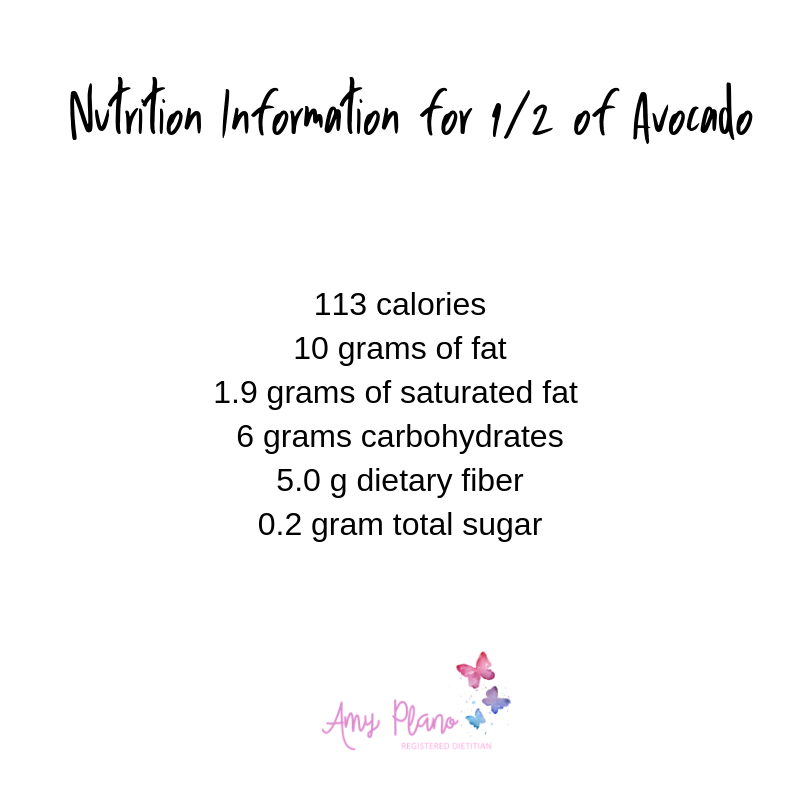
Did you know that a ‘standard’ serving of avocado is actually 1/5 of a whole fruit? Call me crazy but that is a super odd quantity! More importantly who the heck eats 1/5 of an avocado? How do you even divide an avocado into fifths? Most folks easily eat an whole avocado without batting an eye! Therefore, for simplicity sake throughout this article I am going to use one half an avocado as the standard for comparisons.
However, as you can see avocados are predominantly fat and unfortunately do not come without calories. That would be a girl’s dream come true, right? In fact, we actually qualify an avocado as a high calorie, high fat, high fiber, low carbohydrate food. So while their health benefits are seemingly endless we still need to consume them responsibly. More about that later.
So let’s get take a look at those awesome benefits! In today’s blog we are going to examine what I consider to be five of the most important nutritional benefits of avocados. In addition, we will examine different ways of incorporating avocados into your diet so you reap these awesome benefits of these tasty little nuggets of goodness.
Avocados and Heart Disease
Heart disease is the most common cause of death in the world. There are several risk factors associated with increasing the risk of this deadly disease: high cholesterol and hypertension. So it would make sense to start off by discussing avocado’s potential role in decreasing these two critical risks. Let’s tackle the cholesterol piece first.
Avocados Contain Heart-Healthy Fats
What makes a food heart-healthy? You hear this buzzword tossed around all the time. But what does it really mean?

As a dietition, this joke NEVER gets old!
Avocados are almost all fat! In one half of an avocado there are about 10 grams of fat. This means that approximately 75-80 % of all the calories in avocados come from fat. However, foods like avocados contain what we consider “good” fats.
There are two types of good fats – monounsaturated (MUFAs) and polyunsaturated fats (PUFAS). Avocados contain both of these good types of fats. So even though there is 10 grams or so of fat in a serving of avocado – about 8 grams are composed of the good fats.
Impact of Avocados on Cholesterol
Not all cholesterol is ‘bad’ or even consider dangerous from a heart-health standpoint. In the body we create and process two type of cholesterol: LLD and HDL cholesterol.
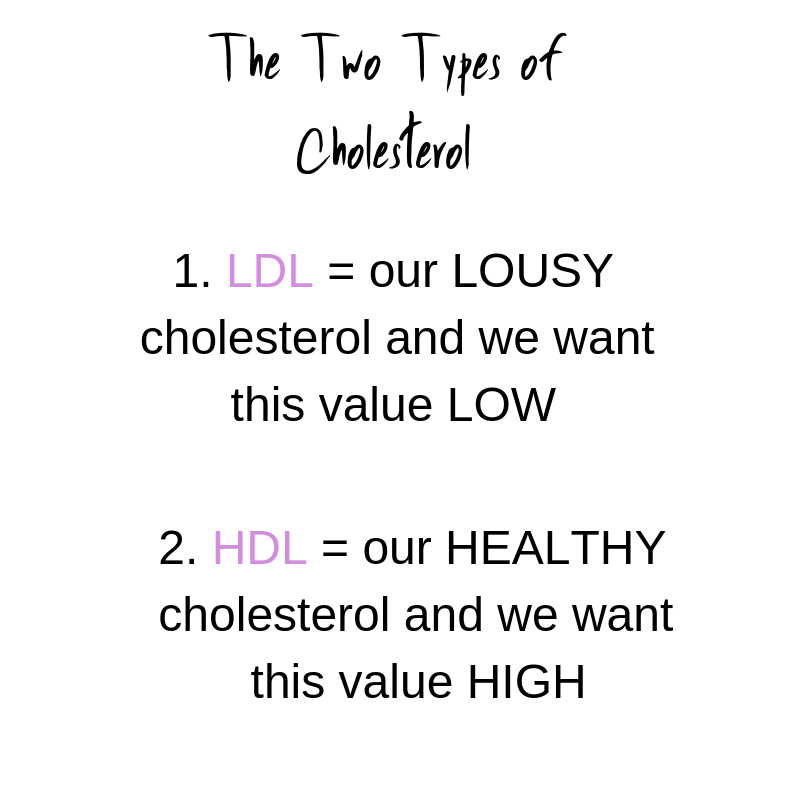
Most cardiologists identify LDL as the type of cholesterol we should be most concerned with. LDL cholesterol is responsible for depositing cholesterol into our arteries. While HDL cholesterol actually does the opposite. HDL cholesterol helps remove the cholesterol from our arteries and disposes of it through our liver.
Therefore, we consider LDL our LOUSY cholesterol level and we want that value low. While HDL is considered our HEALTHY cholesterol and we want this value HIGH.
Back to lovely avocados. The monounsaturated fats in avocados can have a positive effect on heart-health when replacing saturated fats (aka “bad” fats). These heart-healthy fats can help lower overall cholesterol, raise HDL and lower LDL. Can someone say Trifecta?!
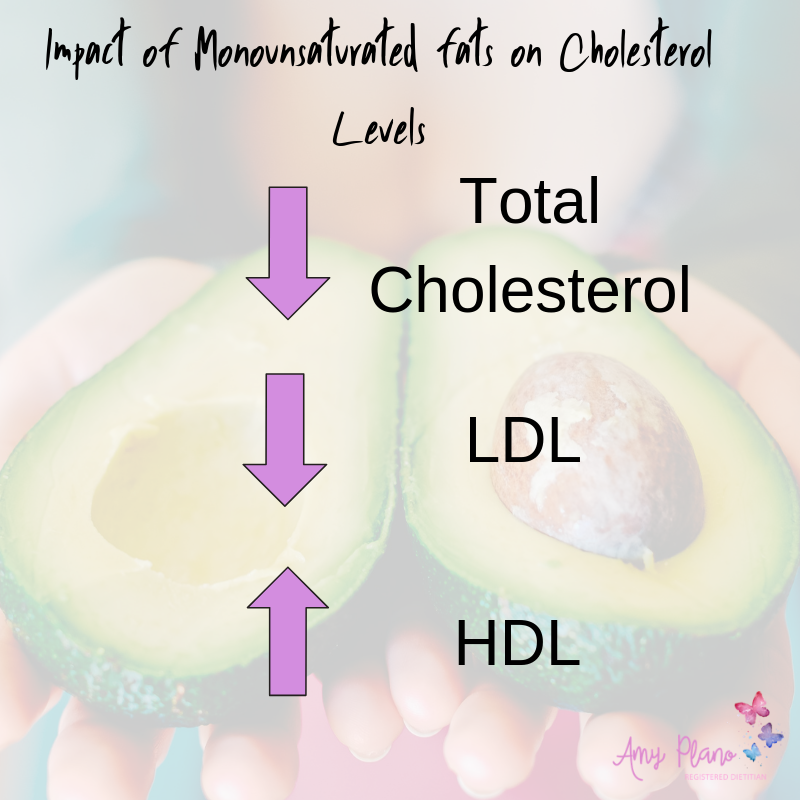
However, just like anything any food (no matter how healthy!) it important to practice portion control with avocados. Depending on its size, like I have aforementioned, a whole avocado clocks in at about 300 + calories and easily 20 grams of fat. Yes, just like we mentioned these ARE good fats. Nonetheless, we need to be responsible with our food choices. Please feel free to eat avocados daily. Just make sure to count them towards your daily calorie and fat totals.
Avocados and Hypertension
Hypertension affects ⅓ of all Americans and is the number one risk factor for heart disease. So how do avocados come into play with this deadly disease? Avocados are high in a nutrient called potassium. A potassium rich diet may help reduce hypertension, fluid retention, protect against stroke and even help prevent osteoporosis [1, 2, & 3]. Whoa. That is a powerful nutrient.
Role of Potassium on Hypertension
Potassium is the third most abundant mineral in the body. It serves many roles in the body all of which depend on the chemical gradient in which it creates. Potassium helps maintain fluid balance, regulates muscle contractions (like in the heart!) as well as sends nerves singles throughout the body. In fact, potassium plays a role in every heartbeat. A hundred thousand times a day, potassium is responsible for triggering your heart to squeeze blood through your body. It also helps your muscle move, kidneys function and makes sure those nerves of yours are functioning properly.
Avocados and Potassium
However, it’s no surprise most people don’t consume enough potassium. After all, the highest source of potassium are fruits and vegetables. And truth be told people are surely slacking in this department.
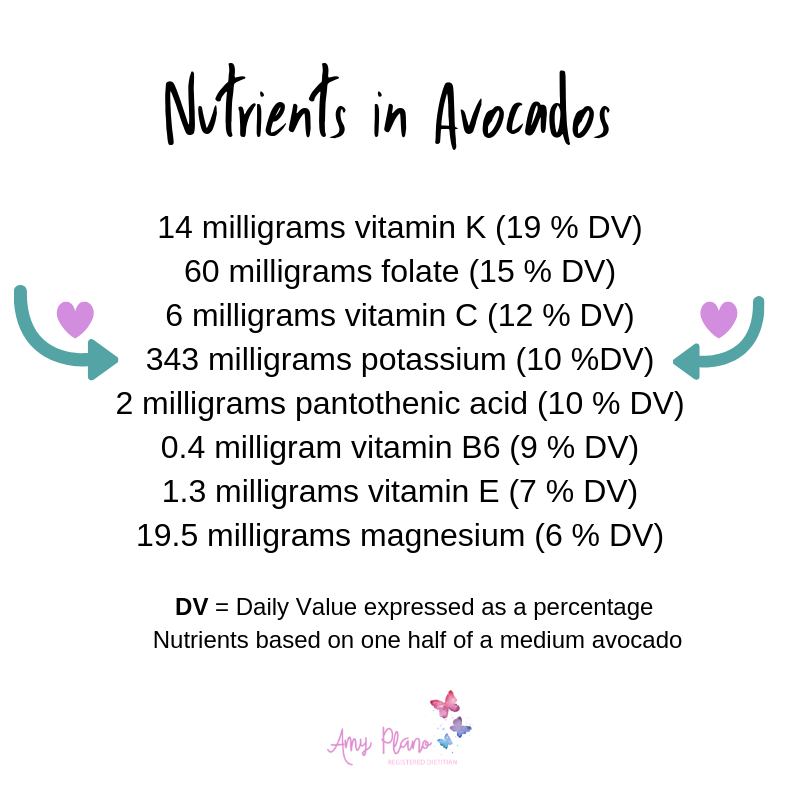
Avocados are full of many important nutrients
In one half of an avocado there is around 350 – 400 mg of potassium. Most health officials (including myself!) recommend consuming 3500 – 4700 mg of potassium per day. In this situation – the more the merrier for sure. Therefore, by consuming avocados regularly in your diet you can inch your way closer to meeting this value.
Avocados and Fiber
Like potassium most folks don’t consume enough fiber. Also like potassium we find the majority of fiber in fruits and veggies as well as complex starches. The average American consumes a whopping 13 grams of fiber per day. Curious where you come in with fiber consumption? Click here to access the fiber content of commonly consumed foods. Optimal fiber intake is set at 25 – 30 grams per day. So we are off by a landslide! Enter our little buddy the avocado.
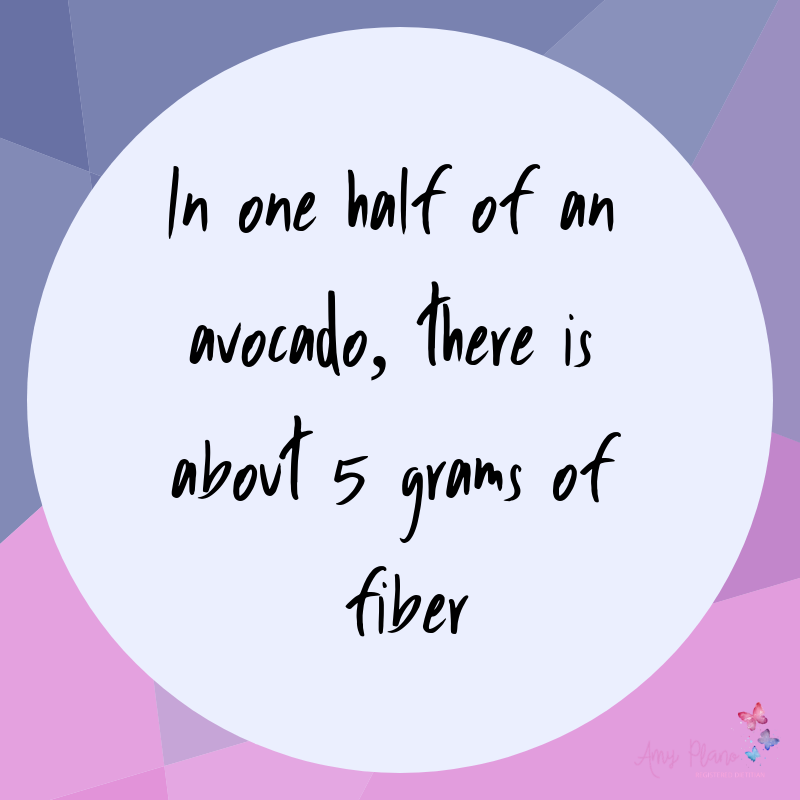
In one half of an avocado, there is about 5 grams of fiber. Not bad for a food that is mostly composed of fat!
Consuming foods that are high in fiber have been linked to reducing the risk of obesity, Type 2 diabetes and heart disease. Fiber also adds bulk to our diet and promotes satiety. Avocados contain a high amount of insoluble fiber. When consumed with an adequate amount of fluid, insoluble fiber promotes optimal digestive health and bowel regularity. Insoluble fiber increases the rate at which material moves through the GI tract. It also generates larger, softer stools that are easier to pass, which helps prevent constipation and strained bowel movements. Lastly, if you suffer from diverticulitis consuming avocados regularly can help prevent flares of this painful condition.
Avocados are Rich in Antioxidants
Avocados contain vitamins A, C and E. All three are are antioxidants that help strengthen your immune system. Carotenoids such as beta-carotene, lutein and zeaxanthin also act as antioxidants and are found in avocados. This abundance of antioxidants helps prevent disease and has been shown to reduce the risk or prevent the progression of cancer.
“Among the twenty most commonly eaten fruits, avocado ranks number one for vitamin E, the carotenoids lutein and zeaxanthin, glutathione and beta-sitosterol,” writes ophthalmologist and author of SuperFoods HealthStyle, Steven G. Pratt. Lutein is one of two carotenoids that form the macular pigment found in the center of the retina. High concentrations of lutein are also found in the lens of the eye. Higher intake of lutein, zeaxanthin and glutathione are associated with reduced risk of cataracts and macular degeneration. Glutathione, called by some experts as the Mother of All Antioxidants, also help fights oxidative stress and free radical damage. Therefore, want to protect your sight? Regularly include avocados in your diet ♥
Avocados Taste Delicious
I had to save the best for last. Reason number 5 for consuming avocados – they taste delicious. When ripe, most avocados have a buttery texture and mild, but nutty flavor profile. It is this fairly muted flavor that lends nicely to pairings with other stronger more overpowering ingredients.
It is impossible to discuss avocados without mentioning guacamole. I feel like if I was stranded on a desert island the only three things I would need to be happy would be: 1. my husband 2. guacamole and 3. peanut butter (off course!) One of my very favorite finds at Trader Joe’s and a staple in The Plano’s home is their Guiltless Guacamole made with Greek Yogurt. With only 30 calories per tablespoon there is very little NOT to love about this food. Got a bag of ripe avocados? Why not make your own guacamole using Alton Brown’s easy to follow guacamole recipe.
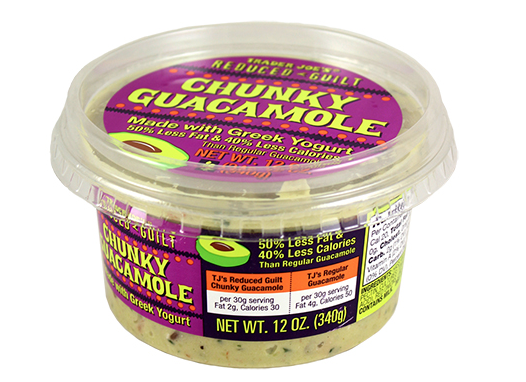
Trader Joe’s Guiltless Guacamole – Yum all day long!
While most commonly consumed in the form of guacamole there are SOOOO many other tasty ways to consume avocados. Here is a fairly basic list of 23 Delicious Ways to Consume Avocados. But if you want to get fancy Epicurious has got you covered with 24 Ways to Eat an Avocado. Please check out # 4 (Hello, Chocolate mousse!) and # 22 which provides new face for an old-time favorite avocado toast. Therefore, there is no shortage of delicious ways to incorporate avocados into your lifestyle.
I know you kiddos are super creative! Was is your favorite way of using these tasty little nutrition powerhouses? Please share in the comments below.
Hugs & High Fives,
Amy
References
1. Schardt D. Potassium: Bones, stones, & strokes on the line. Nutrition Action Healthletter. 2004;31(10):8-9.
2. U.S. Department of Health and Human Services. Part D, Section 7: Fluid and Electrolytes. The Report of the Dietary Guidelines Advisory Committee on Dietary Guidelines for Americans 2005 is Available here.
3. Alderman MH. Presidential Address: 21st Scientific Meeting of the International Society of Hypertension: Dietary sodium and cardiovascular disease: The ‘J’-shaped relation. J Hypertens. 2007;25(5):903-907.
